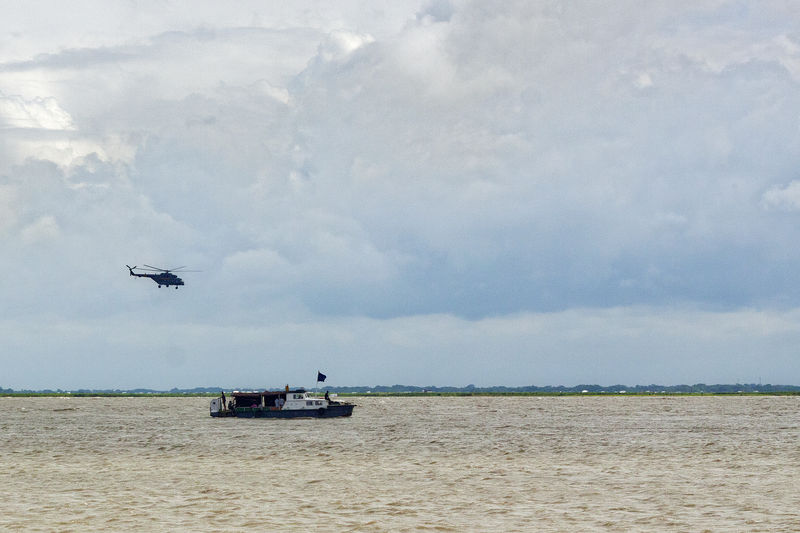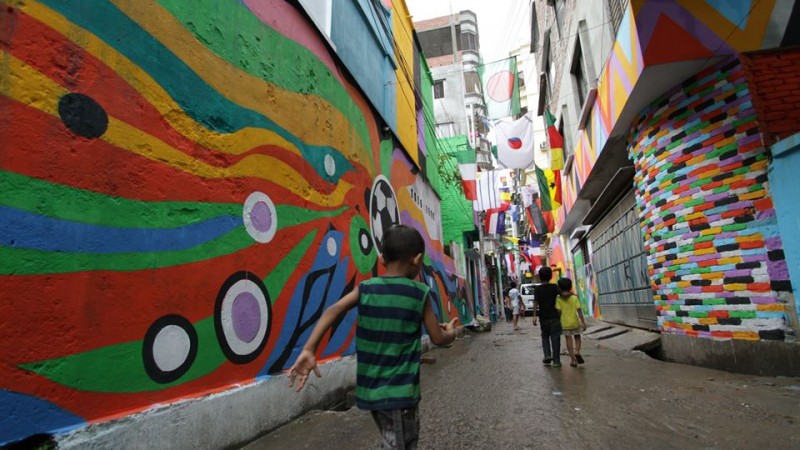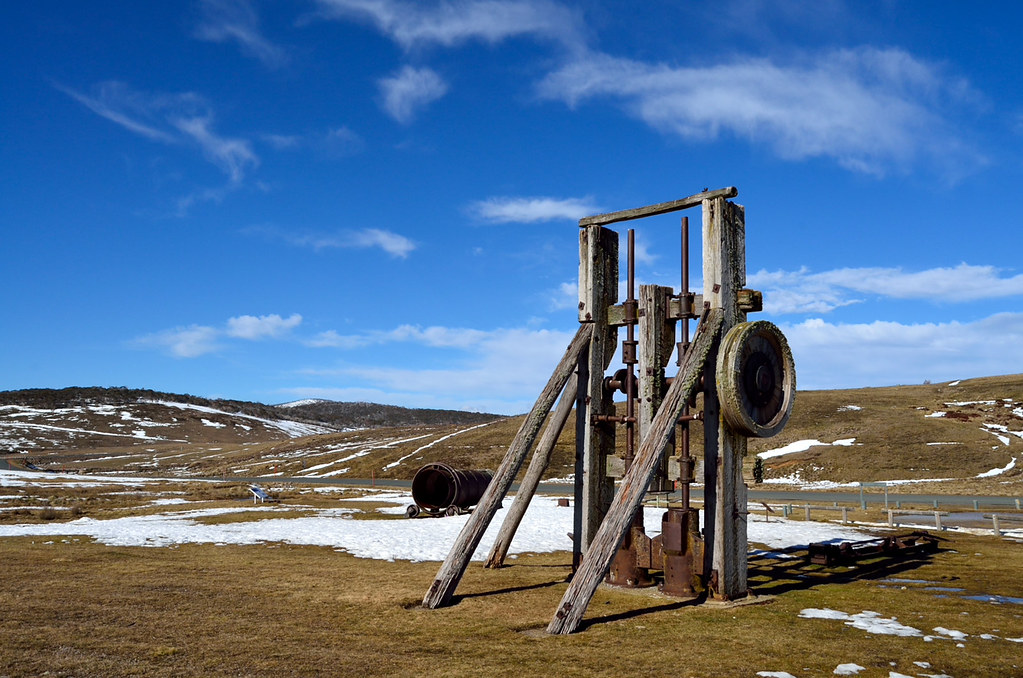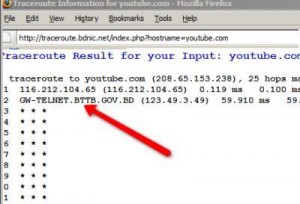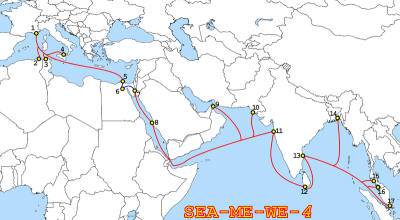 SEA-ME-WE-4 submarine cable network. Image Courtesy Wikimedia Commons
SEA-ME-WE-4 submarine cable network. Image Courtesy Wikimedia Commons
Bangladesh is one of the countries of the world which have been lacking behind in providing adequate and cost effective internet service to its citizen. Bangladesh has missed the bus in the 1990s to be connected to the information superhighway via a submarine cable network and finally was connected in 2006. The
SEA-ME-WE-4 cable initially had a bandwidth capacity of 12 gigabytes per second which was later extended to 44.6 gigabytes.
It took sometime to prepare the infrastructure to use the initial capacity which was 68 times than what was available in Bangladesh via numerous
VSats which mostly provided snail paced dial-up internet service. By the end of 2008 Internet penetration jumped to 4 percent (5 million users), by ten times from 0.4 percent in 2004.
The initial costs were very high, which went down gradually. In 2009 the cost of bandwidth for an ISP
was reduced by further 33% to Taka 18,000 ($260) per one mbps, which was still four times higher than other countries in the region. The government
has been cracking down on VOIP usage by ISPs declaring them illegal and has delayed the licensing process of the approved VOIP providers. The charge of high speed internet was still high and most people resorted to cost effective slow speed internet according to their purchasing power and high priced International Direct Dialing (IDD). These actions reduced the use of bandwidth and left a lot of capacity unused.
Mamun at
Techtunes was
furious [bn] after a report was published in local newspaper that out of approx. 45 gigabytes bandwidth available only about 10 gigabytes was being used by the country and the government is thinking of exporting the excess bandwidth:
যে দেশে ঢাকার বাইরে ইন্টারনেটের একমাত্র ভরসা মোবাইল ইন্টারনেট মানে গ্রামীনফোন। ইন্টারনেটের স্পিড নাই স্পিড পেতে হাজার টাকা দিতে হয়। ইন্টারনেটের সমস্যার কারনে অনেক আইটি প্রতিষ্টান বন্ধ হবার জোগাড়। ব্যান্ডউইথ এর দাম পার Mbps ১৮০০০ হাজার টাকা, আরও হাজার হাজার সমস্যা। সেই দেশের একজন আইটি সাংবাদিক ব্যান্ডউইথ রপ্তানি করার দালালি করে।
In this country outside Dhaka (the capital) the only effective internet coverage available is mobile internet i.e. Grameenphone. For slow speed internet one has to pay a thousand Taka ($15) per month. Because of the problem of internet many IT institutions are on the verge of closing down. One mbps bandwidth costs 18,000 Taka ($260). In that country one IT journalist advocates for bandwidth export.
According to a
recent report [bn] published in
the Daily Samakal, Bangladesh was seriously considering exporting bandwidth as only 23% of the capacity is being utilized. The report quoted
Bangladesh Submarine Cable Company Limited (SBCCL) to inform that the usage of Bandwidth will grow upto maximum 40 gigabyte per second in next five years. BSCCL also thinks that by that time the capacity will be increased by four times.
However Bangladesh has to plan a higher target as the country is ranked at the bottom of the
International internet bandwidth index (per capita) by country.
In a
blog post by SBCCL MD
Engr. Md. Monwar Hossain the upgrade #3 of SEA-ME-WE-4 cable was advocated as the investment will be cheap. Mr. Hossain also said:
BSCCL is planning to provide bandwidth to the rural areas through digital access networks. This endeavour should facilitate Internet access widely and thereby establishment of Digital Bangladesh would expedite. [..]
We can understand that Submarine Cable network would be main infrastructure for “Digital Bangladesh” as planned to be achieved by the year 2021.
The upgrade #3 to the existing capacity of SEA-ME-WE-4 cable can increase the bandwidth capacity to 85 gigabytes.
Ami Modon at
Somewhereinblog.net lists these grievances:
-যেখানে বিশ্বের সর্ব উচ্চ ব্যান্ডউইথ মূল্যের জন্য বাংলাদেশের আইএসপিগুলোকে প্রতি ইউজার ৫ কিলোবাইট হারে ব্যান্ডউইথ ডিস্ট্রিবিউশন প্লান করতে হয়।
-যেখানে সরকার বিশ্বের সর্বচ্চ দামে ব্যান্ডউইথ বিক্রি করে ব্যবহারকারীর সর্বনিম্ন গতি নিশ্চিত করে।
-যেখানে ২০০৭ সাল থেকে দেশের সর্বপ্রথম সাবমেরিন ক্যাবল তার মাত্র (?) ৪৫মেগাবিট ব্যান্ডউইথের ৮০ ভাগ অব্যবহৃত রাখার উদ্দেশে প্রতি মেগাবিট ব্যান্ডউইথের মূল্য তখন এক লাখ (প্রায়) টাকার উপরে রাখে। [..]
এরা আপনাকে কতটা মক্কেল ভাবে যে আপনাকে আবার ডিজিটাল বাংলাদেশের স্বপ্ন দেখায় ?
-Where because of the highest bandwidth price the ISPs of Bangladesh have to plan only 5Kb bandwidth distribution for every user.
-Where the government sells the costliest bandwidth at the lowest possible speed.
-Where 80 percent of the bandwidth available remain underutilized since 2007 because the bandwidth per mbps was initially at 100,000 Taka ($1450) per one mbps. [..]
How stupid you are they think to make you believe their digital Bangladesh dream?
The blogger is also surprised that an international tender has been floated for exporting bandwidth and nobody is protesting:
আমাদের দেশের মানুষের চেতনার লেভেল দেখে অত্যাশ্চর্য না হয়ে পারছি না। এরা সব আদিম অন্ধকার যুগেই বসবাস করছে। আজ যদি দেখা যেত বাংলাদেশের বর্তমান উত্তলিত হতে থাকা গ্যাসের আশি ভাগ রফতানী করার টেন্ডার ঘোষনা করল। তখন নানা কমিটি দেশে একটিভেট হয়ে পুরো দেশ অচল করে দিত। অথচ বাংলাদেশ ইন্টরনেট ব্যান্ডউইথ রপ্তানী করতেছে। আন্তর্জাতিক দরপত্র আহবান করা হয়েছে। দরপত্র জমা দেয়ার শেষ তারিখ ২০শে জুন, ২০১০।
এইটা এদের চেতনার এন্টেনার আশেপাশেও আসলো না। কোথাও কারো টু শব্দটাও শুনলাম। ইলেক্ট্রনিক বা প্রীন্ট মিডিয়ার তো প্রশ্নই ওঠে না ব্লগেও দেখলাম না।
I cannot understand the level of awareness of the people of my country. They are still living in ancient ages. If it would happen that Bangladesh has floated tender for exporting 80% of its gas produce then there would be country-wide protests paralyzing the country. But Bangladesh is exporting internet bandwidth. An international tender has been floated. The last date of application is June 20, 2010.
It did not catch the attention of the people. Nobody even faintly protested. Not in electronic and print media and even in Blogs.
Being a populous country Bangladesh's internet penetration is very low and there is a potential to expand in local market. So the question remains that whether the decision to export without exploring domestic market covers only the profit making interest of the company. BSCCL
is a profitable company and it can take measures to reduce the bandwidth charge for the greater interest of the nation by investing in the third upgrade of the submarine cable or
trying to connect to a second cost effective submarine cable [bn]. As the infrastructure (cable network etc.) is not ready for the bandwidth to be distributed in the rural areas, they can sell the rest of the bandwidth to the mobile operators who will be able to cover the country with their existing networks.
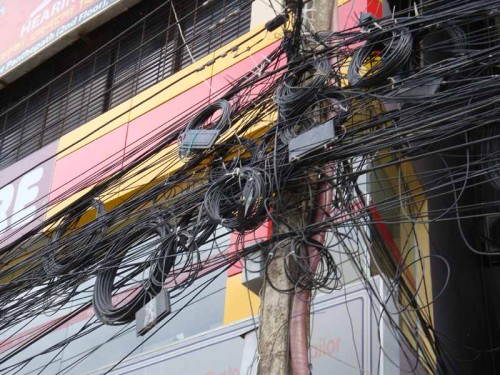 Optical fiber web in a pole in Dhaka. Image Courtesy Wireless Bangladesh
Optical fiber web in a pole in Dhaka. Image Courtesy Wireless Bangladesh at
Wireless Bangladesh shows how the optical fiber network deployment in the city is creating hazards and the mobile operators can be used to distribute bandwidth:
If Digital Bangladesh is a dream, Digital Dhaka is already a reality. Mobile operators have excellent coverage in terms of Voice and Data. Numbers of Telecom towers are significant. ISPs operating with wired and wireless connection have dense city wide coverage. So it is relatively straightforward for Telecom operators and ISPs to provide any type of connectivity as a last mile solution according to user’s convenience. But wired network, particularly spider web of overhead optical fiber based network has converted the roads of Dhaka to a living hazard.
Arild Klokkerhaug, the head of the largest Bangla blogging platform
Somewhereinblog.net comments:
"Can the govt of Bangladesh please ensure that all decisions makers are informed about the thing called internet? I am afraid that somehow, some top people are still stuck in the past century. We are having one of the least available, least stable and most expensive internet connections in the world, and now the govt has issued an international tender to lease out a big chunk of the little bandwidth we have??? To develop the nation, the country should get 20 times more bandwidth, and sell it for 20 times less the price today, to people and businesses in Bangladesh only. then the economy could boom through digital Bangladesh."
(Also published in Global Voices Online)

















